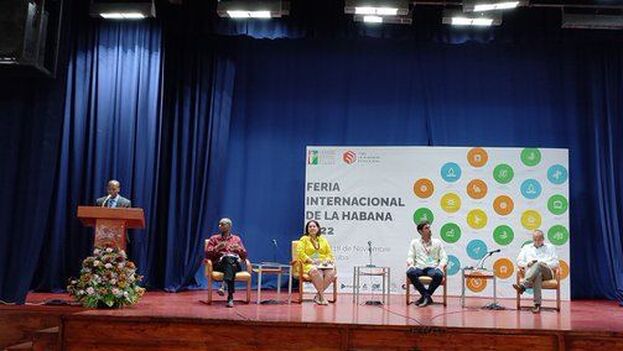
![]() EFE/14ymedio, Havana, 19 November 2022 — The Government of Cuba concluded this Friday the 38th edition of the Havana International Fair (Fihav) with the commitment to reduce “the obstacles that can hinder the business climate” on the Island.
EFE/14ymedio, Havana, 19 November 2022 — The Government of Cuba concluded this Friday the 38th edition of the Havana International Fair (Fihav) with the commitment to reduce “the obstacles that can hinder the business climate” on the Island.
During the closing of the event, Interim Minister of Internal Trade and Foreign Investment, Ana Teresita González, stressed that the “biggest milestone” of the fair was the presence of “new economic actors and Cubans living abroad.” Since 2021 almost 6,000 small and medium-sized enterprises [SMEs] have been approved.
This year, Fihav focused on attracting the investment of Cubans abroad, especially from the United States, who had a special panel dedicated to them for the first time. The Government has been discreet about the identity of these Cuban-American businessmen, and the official press has not described the supposed opportunities offered to the group.
Rodrigo Malmierca, Minister of Foreign Trade, stated that Fihav was designed “specifically so that they know better what can be done” and “to give them all the information so that they can do business with Cuba.” Fihav’s official sites have avoided disseminating the content of these “special” panels and meetings, although the minister reported that American firms — including those of Cubans living in the United States — should in any case ask for permission from the U.S. Treasury Office of Foreign Assets Control.
The Island’s main commercial exchange ended with more than 50 agreements signed between Cuba and foreign companies, according to the president of the Chamber of Commerce, Antonio Luis Carricarte, speaking on state television.
In total, 402 Cuban companies were present, 70 of them SMEs, and delegations from 62 countries.
The Organizing Committee recognized the pavilions of South Africa, Italy, Venezuela and Mexico “for the quality of their designs and the massive participation of their companies,” according to the Cuban News Agency.
The Mexican pavilion — with 40 companies — received special attention from the Island executives, who are aligned with the Government of Andrés Manuel López Obrador.
On the Fair’s Mexico Day, last Tuesday, three Cuban ministers were present: Malmierca of Foreign Trade and Foreign Investment, Juan Carlos García Granda of Tourism and Eloy Álvarez of Industries.
Cuba took advantage of this opportunity to present, as it usually does at this event, its portfolio of investment opportunities with 708 projects, 30 more than in 2021, in which the food production sector cornered 197 of them.
Due to the health measures from the coronavirus pandemic, the Fihav had been replaced in 2020 and 2021 by a business forum and a virtual fair.
The last face-to-face edition, in 2019, was attended by more than 4,000 participants from about 70 countries, of which Spain was the most represented with 110 companies, 30 more than in this edition, according to official data.
Two hundred eighty foreign companies from some 40 countries operate on the Island, including Spain, Canada and China.
The Cuban Government has relaxed its rules to attract more foreign capital in different areas of the economy, in the midst of a deep crisis — and the lack of currency in circulation — as a result of the pandemic, US sanctions and errors in management.
Translated by Regina Anavy
____________
COLLABORATE WITH OUR WORK: The 14ymedio team is committed to practicing serious journalism that reflects Cuba’s reality in all its depth. Thank you for joining us on this long journey. We invite you to continue supporting us by becoming a member of 14ymedio now. Together we can continue transforming journalism in Cuba.
